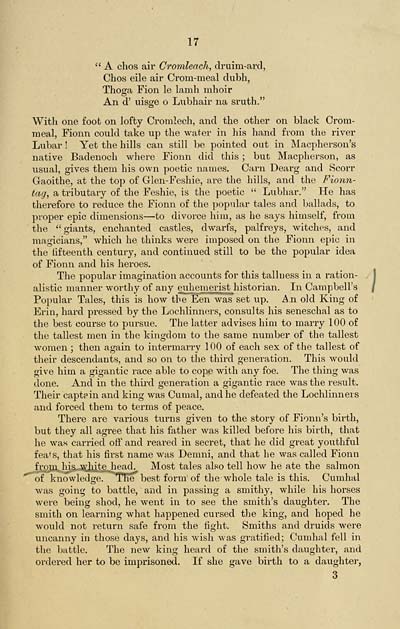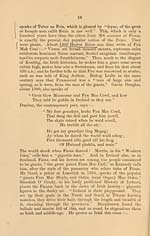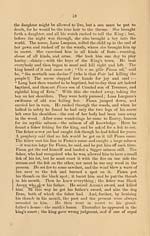Download files
Complete book:
Individual page:
Thumbnail gallery: Grid view | List view

17
" A chos air Gromleach, ch'uim-ard,
Chos eile air Crom-meal dubh,
Thoga Fion le lamh mhoir
An d' uisge o Lubhair na sruth."
With one foot on lofty Cromlech, and the other on black Crom-
meal, Fionn conld take up the water in his hand from the river
Lubar ! Yet the hills can still be pointed out in Macphcrson's
native Badenoch where Fionn did this ; but Macpherson, as
usual, gives them his own poetic names. Carn Dearg and Scorr
Gaoithe, at the top of Glen-Feshie, are the hills, and the Fionn-
tag, a tributary of the Feshie, is the poetic " Lubhar." He has
therefore to reduce the Fionn of the i)opular tales and ballads, to
proper epic dimensions — to divorce him, as he says himself, from
the " giants, enchanted castles, dwarfs, palfreys, witches, and
magicians," which he thinks were imposed on the Fionn epic in
the fifteenth century, and continued still to be the popular idea
of Fionn and his heroes.
The popular imagination accounts for this talliiess in a ration-
alistic manner worthy of any euhe merist historian. In Campbell's
Popular Tales, this is how the Een was set iip. An old King of
Erin, hard pressed by the Lochlinn(;rs, consults his seneschal as to
the best course to pursue. The latter advises hiai to marry 100 of
the tallest men in the kingdom to the same number of the tallest
women ; then again to intermarry 1 00 of each sex of the tallest of
their descendants, and so on to the third generation. This would
give him a gigantic race able to cope with any foe. The thing was
done. And in the thii-d generation a gigantic race was the result.
Their capt?in and king was Cumal, and he defeated the Lochlinners
and forced them to terms of peace.
There are various turns given to the story of Fionn's birth,
but they all agree that his father was killed before his birth, that
he was carried off and reared in secret, that he did great youthful
fea*s, that his first name was Demni, and that he was called Fionn
fvny p Trig \ y j jitp! h p.n.d. Most tales also tell liow he ate the salmon
of knowledgeT ~The best form of the whole tale is this. Cumhal
was going to battle, and in passing a smithy, while his horses
were being shod, he went in to see the smith's daughter. The
smith on learning what happened cursed the king, and hoped he
would not return safe from the fight. Smiths and druids were
uncanny in those days, and his wish was gratified; Cumhal fell in
the battle. The new king heard of the smith's daughter, and
ordered her to be imprisoned. If she gave birth to a daughter,
3
" A chos air Gromleach, ch'uim-ard,
Chos eile air Crom-meal dubh,
Thoga Fion le lamh mhoir
An d' uisge o Lubhair na sruth."
With one foot on lofty Cromlech, and the other on black Crom-
meal, Fionn conld take up the water in his hand from the river
Lubar ! Yet the hills can still be pointed out in Macphcrson's
native Badenoch where Fionn did this ; but Macpherson, as
usual, gives them his own poetic names. Carn Dearg and Scorr
Gaoithe, at the top of Glen-Feshie, are the hills, and the Fionn-
tag, a tributary of the Feshie, is the poetic " Lubhar." He has
therefore to reduce the Fionn of the i)opular tales and ballads, to
proper epic dimensions — to divorce him, as he says himself, from
the " giants, enchanted castles, dwarfs, palfreys, witches, and
magicians," which he thinks were imposed on the Fionn epic in
the fifteenth century, and continued still to be the popular idea
of Fionn and his heroes.
The popular imagination accounts for this talliiess in a ration-
alistic manner worthy of any euhe merist historian. In Campbell's
Popular Tales, this is how the Een was set iip. An old King of
Erin, hard pressed by the Lochlinn(;rs, consults his seneschal as to
the best course to pursue. The latter advises hiai to marry 100 of
the tallest men in the kingdom to the same number of the tallest
women ; then again to intermarry 1 00 of each sex of the tallest of
their descendants, and so on to the third generation. This would
give him a gigantic race able to cope with any foe. The thing was
done. And in the thii-d generation a gigantic race was the result.
Their capt?in and king was Cumal, and he defeated the Lochlinners
and forced them to terms of peace.
There are various turns given to the story of Fionn's birth,
but they all agree that his father was killed before his birth, that
he was carried off and reared in secret, that he did great youthful
fea*s, that his first name was Demni, and that he was called Fionn
fvny p Trig \ y j jitp! h p.n.d. Most tales also tell liow he ate the salmon
of knowledgeT ~The best form of the whole tale is this. Cumhal
was going to battle, and in passing a smithy, while his horses
were being shod, he went in to see the smith's daughter. The
smith on learning what happened cursed the king, and hoped he
would not return safe from the fight. Smiths and druids were
uncanny in those days, and his wish was gratified; Cumhal fell in
the battle. The new king heard of the smith's daughter, and
ordered her to be imprisoned. If she gave birth to a daughter,
3
Set display mode to: Large image | Transcription
Images and transcriptions on this page, including medium image downloads, may be used under the Creative Commons Attribution 4.0 International Licence unless otherwise stated. ![]()
| Early Gaelic Book Collections > Ossian Collection > Heroic and Ossianic literature > (19) |
|---|
| Permanent URL | https://digital.nls.uk/79495892 |
|---|
| Description | Selected books from the Ossian Collection of 327 volumes, originally assembled by J. Norman Methven of Perth. Different editions and translations of James MacPherson's epic poem 'Ossian', some with a map of the 'Kingdom of Connor'. Also secondary material relating to Ossianic poetry and the Ossian controversy. |
|---|
| Description | Selected items from five 'Special and Named Printed Collections'. Includes books in Gaelic and other Celtic languages, works about the Gaels, their languages, literature, culture and history. |
|---|

